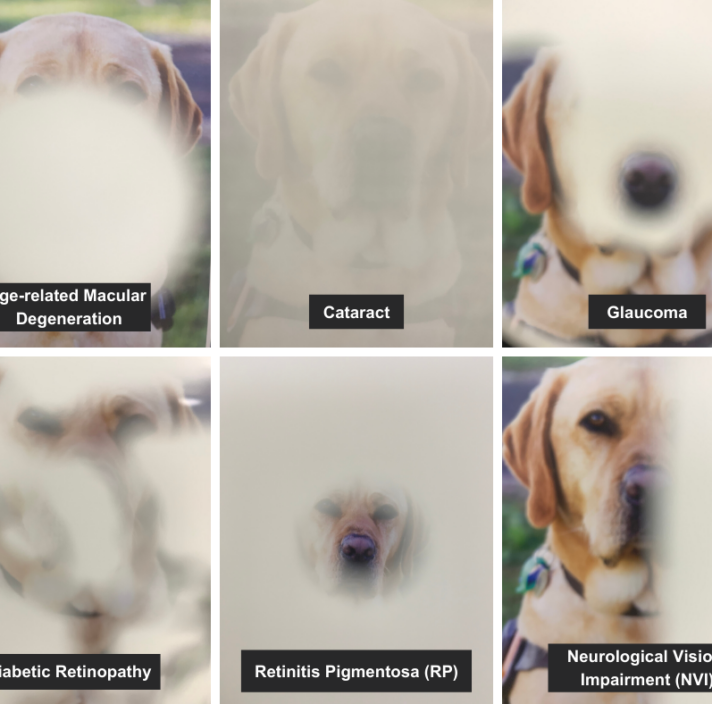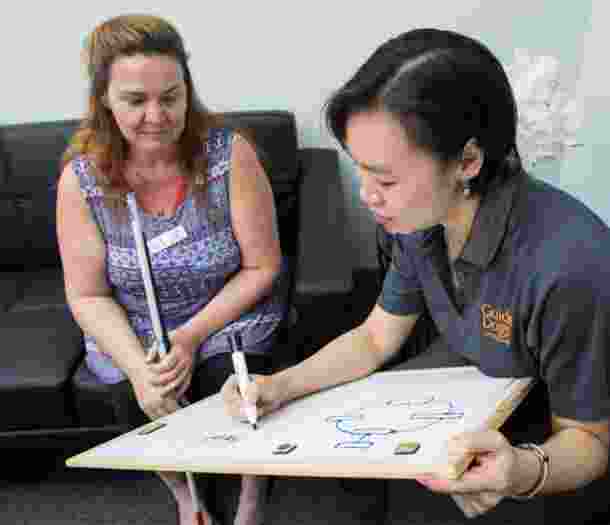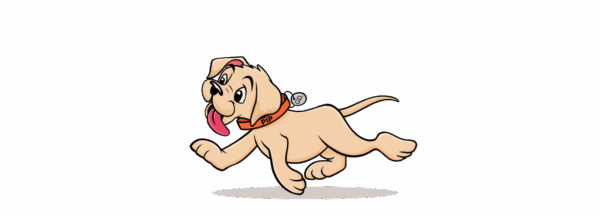Did you know Guide Dogs is the Queensland Government’s peak body service for low vision and blindness in Queensland?
We are proud to partner with the Queensland Department of Child Safety, Disability Services and Seniors to assist all Queenslanders regardless of their eye condition or where they are in their vision loss journey.
At Guide Dogs, our mission is to enable people with low vision or blindness to gain the freedom and independence to move safely and confidently around their communities. That way, every person has the chance to fulfil their potential and live the life of their choosing.
As a peak body, Guide Dogs receives funding to provide information, referral services, advocacy and community awareness to anyone who is seeking it. This means we don’t just talk about what Guide Dogs does, but all services available to people experiencing low vision or blindness.
Our aim is to be a reliable source of information and support for anyone experiencing vision loss or for those people who care for someone else with low or no vision.
What is vision loss?
Whether it be through accident, illness, injury, genetic inheritance or an ongoing condition, anyone can experience vision loss at any time.
Vision is a broad spectrum between fully sighted and totally blind. Often, people imagine someone with a vision condition cannot see anything, but this is not necessarily the case.

-
Making workplaces, leisure, travel and community spaces and services accessible for people living with low vision or blindness.
Looking for other Disability Peak Body support?
Queenslanders with Disability Network (QDN) provides an overarching leadership and coordination role across funded peak bodies. QDN also provides information, advice and support to people with disability about their rights, available services and opportunities for economic and social participation.
- Queenslanders with Disability Network
Phone: 1300 363 783
Autism is a complex lifelong developmental disability that can cause differences in communication, interacting with others and experiences in everyday situations.
- Autism Queensland
Phone: (07) 3273 0000
Includes people in the Deaf community, the Deaf community’s language and culture, and people with hearing impairment and hearing loss.
- Better Hearing Australia Brisbane
Phone: (07) 3844 5065 - Deaf Connect
Phone: 1800 893 855
Conditions associated with intellectual disability, difficulties in learning and performing certain daily life skills and limitations of adaptive skills in the context of community environments compared to others of the same age. Examples include Down Syndrome, Williams Syndrome, Prader Willi Syndrome, Angelman Syndrome, Fragile X, cri-du-chat syndrome.
- Down Syndrome Queensland
Phone: (07) 3356 6655
Conditions that are attributable to a physical cause or impact on the ability to perform physical activities, such as mobility. Examples include paraplegia, quadriplegia, muscular dystrophy, motor neurone disease, neuromuscular disorders, cerebral palsy, absence or deformities of limbs, spina bifida, arthritis, back disorders, ataxia, bone formation or degeneration, scoliosis.
- Spinal Life Australia
Phone: 1300 774 625
Neurological disability applies to impairment of the nervous system occurring after birth, including epilepsy and organic dementias (for example, Alzheimer’s disease) as well as such conditions as multiple sclerosis and Parkinson’s disease. Acquired brain injury is used to describe multiple disabilities arising from damage to the brain acquired after birth. Results in deterioration in cognitive, physical, emotional or independent functioning. May be as a result of accidents, stroke, brain tumours, infection, poisoning, lack of oxygen or degenerative neurological disease.
- Synapse
Phone: 1800 673 074
Developmental delay, global developmental delay—applies to children aged 0–5 where conditions have appeared in the early developmental period, but no specific diagnosis has been made and the specific disability group is not yet known.
- Xavier Children’s Support Network
Phone: 1800 928 437
Schizophrenia, affective disorders, anxiety disorders, addictive behaviours, personality disorders, stress, psychosis, depression and adjustment disorders.
Carers provide ongoing, unpaid care or support for family members or friends who need help with everyday tasks because of disability.
- Carers Queensland
Phone: 1300 747 636
People with disability from culturally and linguistically diverse backgrounds, their family members and carers.
- AMPARO
Phone: (07) 3354 4900
People with disability, their families and carers, in the areas of Barcaldine, Barcoo, Blackall-Tambo, Boulia, Diamantina, Longreach, and Winton.
- Outback Independent Living
Phone: 0477 645 577
All Aboriginal peoples and Torres Strait Islander peoples with disability including both adults and children with disability living in urban, regional, rural and remote areas of Queensland.
(To be advised following the outcome of an open grant process)
Looking for Information about Low Vision or Blindness?
Contact us on 07 3500 9060, email us on clients@guidedogsqld.com.au or fill in the enquiry form below.

